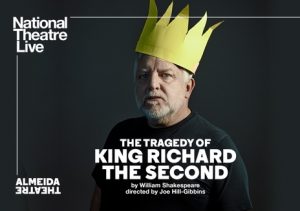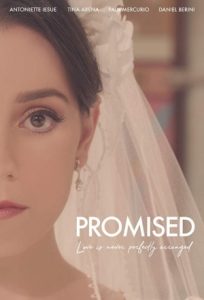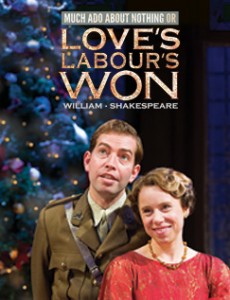Simon Russell Beale may be one of the pre-eminent Shakespearean actors of today, but it seems even someone of his presence can be let down by his surroundings. In the bard’s Tragedy of King Richard the Second Beale takes on a king who since inheriting the throne as a young boy had never known anything different and found it hard to believe that his right to rule was anything but divine. This is a man who had fought off a rebellion against his rule and seen fit to either knock off or exile almost all of the original appellants, kicking off a volatile final few years in power. As ever Beale commands the stage, but owing to the play’s ultra-minimalist production for the National Theatre Live series, it is at the expense of the cast he shares the stage with.
Beale is almost double the age Richard was at the time of this play’s setting, spanning from 1398 until his sorry demise in 1400, but Beale has a young man’s energy and he captures the petulance and naivety of Richard in a performance that ranges from arrogance to contrition, from cruelty to cruelled. How predictable to us and yet what a shock for Richard it must have been in 1398 when his cousin and rival claimant to the throne, Henry Bolingbroke (an impressive Leo Bill) — whose family Richard had deposed and stripped land from — might rally support and seek to overthrow him in the wake of the tyranny Richard had unleashed upon his challengers. And yet what a moment for introspection for Richard, who as the drums louden begins to despair at his impending loss of identity, contemplating for the first time who he might be if all he knew were taken from him. Who might the king be if he were king no longer?
Beale has the chops and the freedom to convey these conflicts, internal and external, in a very physical performance because he has only one personality to worry about. The rest of the cast — a little over a handful playing over double the amount of characters without ever leaving the stage — do not have the same liberty. An abridged script and a lack of any visual cues strain the ears as the audience are forced to listen hard for the changing personas of many of the plain-clothed supporting cast. While they are not poor, the production constraints do make it difficult for some of the minor players to make their mark, even Saskia Reeves, who plays Thomas de Mowbray among others, and Joseph Mydell, responsible for John Gaunt, Bolingbroke’s father. Not helping matters is the nature of the cast’s assembly. Often huddled together in private discussion or royal counsel, their lines and personalities are lost to the mere act of facilitating Richard and Henry’s career trajectories.
Director Joel Hill-Gibbins is ambitious in stripping the play of all costumes and props, bar a few labelled buckets of dirt and blood and a walled-in room from which the cast cannot escape. If you’re not familiar with the play already, you could be in for a disorientating experience, and if you are familiar with the play, you might be disappointed by how much the production’s spare execution takes away from the original material. The play naturally gravitates to the changing dynamic between Beale and Bill—the latter of whom plays a passionate but hesitant ascendant to the throne—but it misses something in the process and can be a bit of a mess at times.
That this is a play about power is not rare for Shakespeare, but in Richard II Hill-Gibbins has evidently found an apt analogy for the current Brexit crisis consuming Britain’s leadership. In this reading authority is tainted through misuse of power, new dawns are promised, claims are made and the bickering continues in earnest even as Richard’s imprint on the throne cushion is still warm. To see Hill-Gibbins’s production is to imagine Britain’s aspiring power-brokers trapped within a bubble of their own imagining, brawling among themselves over rights to rule in a chaotic conversation that seems to exclude most of the people they govern for. The general mood is either blackly funny or dispiriting in its defeatism—that there are no real winners in this whole fiasco. ‘From Richard’s night to Bolingbroke’s fair day’, Richard muses upon Henry’s march to power from exile, but it is hard to read into such a line anything but regret and cynicism, and so the world moves on without any agreement on who is best placed to lead the way. Gee, what a lovely thought.
National Theatre Live: The Tragedy of King Richard the Second screens for a limited time from 20th April through Sharmill Films.





